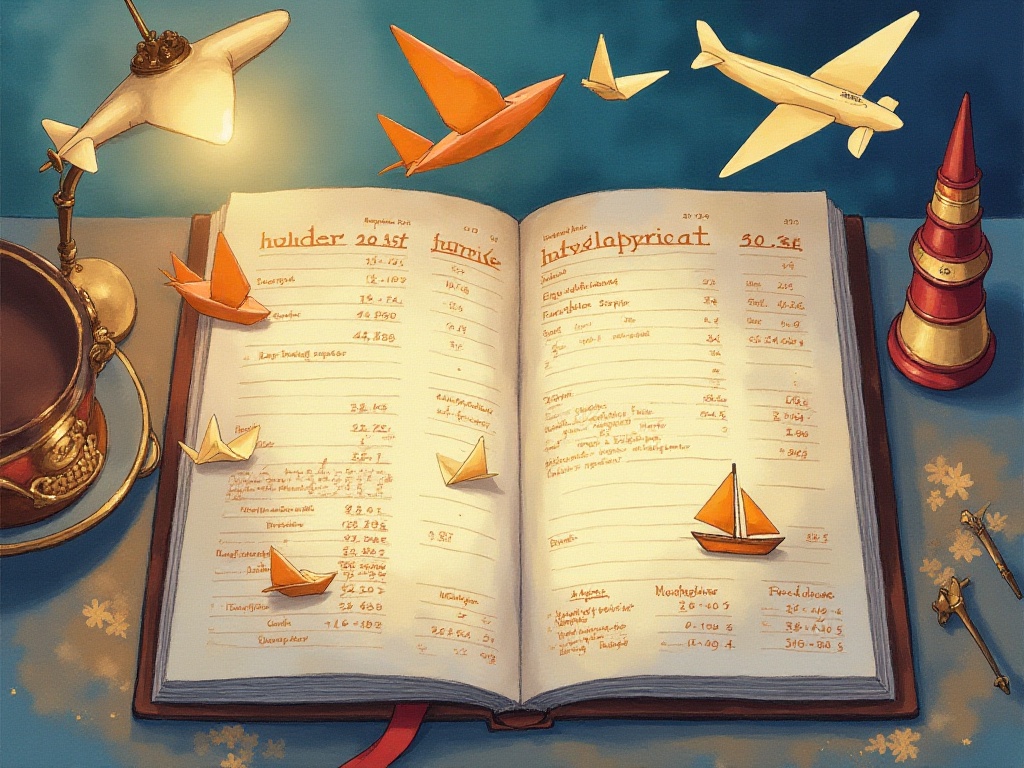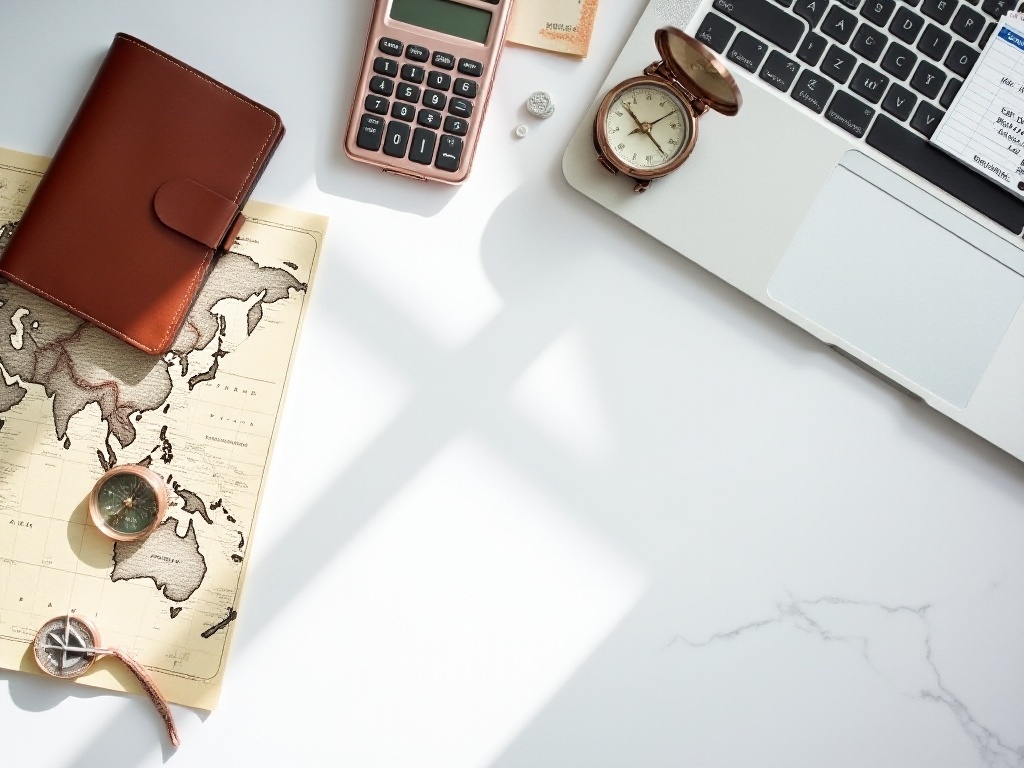Introduction
Hi everyone, I'm Little P! Recently, I've been bombarded with messages from many friends asking about budgeting for independent travel in Europe. As a seasoned "spendthrift" who just completed a 45-day in-depth tour of 8 European countries, I'd like to share my budgeting experience in detail. After reading this article, you'll learn how to scientifically and reasonably plan your own European dream trip!
Total Budget Overview
I remember when I first started planning my European trip, I felt suffocated just thinking about how much it would cost, feeling like my wallet was bleeding profusely. However, after thorough research and on-site investigation, I discovered that travel budgeting can be carefully calculated. Based on my personal experience, a 45-day in-depth European tour for one person is reasonably budgeted at 80,000-100,000 RMB. While this number might make you gasp, don't panic - I'll teach you step by step how to calculate each expense precisely, making your European dream more achievable.

Essential Expenses
Let's first discuss the mandatory expenses. The Schengen visa fee is about 2,000 yuan - this is non-negotiable, and I recommend using a reliable visa agency. Though more expensive, it can greatly increase the visa approval rate. Insurance costs around 1,500 yuan - this cannot be skimped on, and I suggest choosing comprehensive global travel insurance that covers medical, accident, flight delays, and multiple protections. Round-trip airfare ranges from 7,000 to 9,000 yuan, mainly depending on your choice of airline, season, and specific route.
Speaking of buying airline tickets, here's a little secret. Airlines often launch promotional campaigns during specific periods, such as New Year's, Spring Festival, and May Day holidays. I kept watching a certain airline's official website and APP, enabled price change alerts, and finally grabbed a super value ticket during the New Year's promotion - only 6,800 yuan round trip, nearly 3,000 yuan cheaper than usual. So if you have time, I suggest starting to monitor ticket prices 3-6 months in advance.

Accommodation Costs
Accommodation is a significant expense, and my budget was 300-400 yuan per night. In tourist hotspots like Paris and Amsterdam, even a clean and safe hostel bed costs over 200 yuan, and single rooms are even more expensive. However, there are ways to save money - the key is knowing what trade-offs to make.
My accommodation strategy was this: choose youth hostels in big cities to save money and meet friends from around the world; in small cities, choose guesthouses to experience authentic local life. For example, the hostel I stayed at in Venice was a treasure - only 180 yuan per night, located right by the Grand Canal. I could hear gondoliers singing while lying in bed, and I met a group of interesting travel companions whom I still keep in touch with.
During my week in Paris, I chose a hostel in Montmartre. Although it was a six-bed dorm, it was very clean and tidy, and right next to the metro station, making travel very convenient. What delighted me most was that this hostel had a fully equipped public kitchen where I often cooked with my roommates, not only saving money but also experiencing "international culinary cultural exchange."
In a Tuscan town, I stayed at a guesthouse run by an Italian grandmother, where I learned that Italians truly live a "slow food, slow life" lifestyle. Every morning I could smell fresh bread, and grandmother would teach me how to make authentic pasta. This kind of experience is something you'll never get staying in hotels.
Food and Drink Expenses
Regarding food and drink, my budget was 200-300 yuan per day. In Europe, restaurant expenses are indeed high, with a proper lunch starting at least 20 euros. But after 45 days of practice, I developed a strategy for eating well while saving money.
First, breakfast. I usually bought bread, jam, yogurt, and fruit from supermarkets to eat at my accommodation. European supermarkets offer good value - an authentic baguette costs just 1 euro, and paired with local cheese, it's absolutely perfect.
For lunch, I would go to affordable restaurants frequented by locals, many of which offer weekday lunch sets priced between 10-15 euros. In Paris's Latin Quarter, I found many student restaurants where lunch was only 8 euros, with large portions and delicious food.
For dinner, if I wasn't particularly hungry, I would usually shop at supermarkets. European supermarkets have many ready-to-eat salads, sandwiches, and various delicious prepared foods. Buying these to eat at my accommodation, paired with a glass of wine, was the most enjoyable dinner time.
In Florence, I made a great discovery. There was a restaurant where the head chef had a three-Michelin-star background, offering lunch sets for only 25 euros, including appetizer, main course, and dessert, with each dish being art-level quality. The same set would cost at least 80 euros for dinner. So my advice is, if you want to experience high-end restaurants, try to choose lunch hours for better value.

Transportation Costs
Regarding transportation, the most worthwhile investment is the Eurail Pass. I bought a 2-month pass for 4,200 yuan. This pass was my money-saving magic tool, allowing me to freely travel between 8 countries. For example, a single ticket from Paris to Amsterdam costs over 200 euros, but with the rail pass, you can ride freely without worrying about language barriers or ticket booking issues.
While using the Eurail Pass, I also discovered some tips. For instance, some express trains require advance seat reservations - it's recommended to book at least a week ahead to get the best seats. Also, learning to read timetables is important, as some routes may require transfers, and planning routes in advance can save a lot of time.
Within cities, I would buy local transport cards. In Berlin, a week-long public transport card was only 30 euros, allowing unlimited rides on subways, trams, and buses. Consider that a single ticket costs 3 euros - it pays for itself after about ten rides. Plus, having a transport card means not having to buy tickets each time, which is very convenient.
In Amsterdam, I tried cycling. Renting a bike cost only 50 euros per week - not only saving money and being environmentally friendly but also allowing me to experience the city's charm like a local. Cycling along the canals, looking at the historic buildings on both sides - that feeling was truly wonderful.

Attraction Tickets
Attraction tickets can be one of the most expensive items in European independent travel. In Paris, for example, the Louvre is 17 euros, Versailles Palace 18 euros, and the Eiffel Tower top floor 26 euros. Without proper planning, ticket costs alone can make your budget exceed.
My money-saving secret is: always research each city's museum pass system in advance. In Paris, I bought a Museum Pass - 62 euros for 4 days, allowing visits to over 60 museums and attractions. Just the tickets for the Louvre, Musée d'Orsay, and Versailles Palace add up to over 50 euros, so this card not only saves money but also saves time queuing for tickets.
In Rome, the Roma Pass is an even better money-saver. 31 euros for 72 hours, including not only tickets to all major attractions but also free public transportation. The Colosseum and Vatican Museums tickets alone cost over 40 euros, so this card is really worth it.
Additionally, many museums have free admission periods. For example, many Paris museums are free on the first Sunday of each month, and the Louvre is free on Friday evenings for people under 26. I timed my visits accordingly, not only saving on ticket costs but also avoiding peak tourist crowds.

Shopping Budget
Honestly, visiting Europe without buying anything to bring back makes the trip feel incomplete. My shopping budget was 15,000 yuan, mainly divided into three categories: local specialties, souvenirs, and luxury goods.
Before shopping, you must do your homework. For example, understand price differences for various brands in different countries, and know what items are best bought where. Buying perfumes and cosmetics in France, leather goods in Italy, watches in Switzerland - these are basic knowledge.
I found a GUCCI bag at the Milan outlet that originally cost 15,000 yuan, but after discounts was only 9,000 yuan, nearly 4,000 yuan cheaper than mainland China boutiques. However, I remind everyone to be rational when shopping - don't go crazy buying just because things are cheap, as you still need to consider luggage allowance.
At Galeries Lafayette in Paris, I timed my visit with the summer sales. Not only did I get the makeup I wanted, but I also got tax refund forms. When processing the tax refund at the airport, I really felt like I got a deal. However, note that tax refunds have thresholds - generally, single purchases must exceed 175 euros to enjoy tax refund benefits.
Emergency Fund
This is really important - I set aside 10,000 yuan for emergencies, and it actually came in handy. In Venice, I accidentally dropped my phone into the Grand Canal. Although I retrieved it immediately, it was water-damaged beyond repair. I had to buy a new phone, which cost over 4,000 yuan. Without this emergency fund, I would have had to change my later itinerary.
Besides the phone incident, I also experienced luggage delay. During a transfer in Rome, the airline lost my luggage, which took three full days to recover. During these three days, I had to buy some necessities, spending nearly 1,000 yuan. So, emergency funds are truly "lifesaving money" for travel - you must set aside enough.
Money-Saving Tips
After 45 days of practice, I've summarized some practical money-saving tips to share:
First, credit card points. I usually accumulate credit card mileage points, and this time I exchanged points for an outbound flight ticket, saving over 4,000 yuan. Plus, using credit cards in Europe allows continued point accumulation - it's truly profitable.
Second, booking website membership points. Before departure, I registered as a member on several booking websites and frequently monitored their special offers. After booking multiple rooms, you can enjoy additional member discounts. Sometimes with luck, you might find time-limited special deals.
Third, fully utilize student discounts. Young people under 26 can enjoy many preferential policies in Europe, such as discounts on museum tickets and transportation fares. Although you might only save a few euros each time, it adds up over 45 days to significant savings.
Finally, always compare prices. Whether for accommodation, flights, or attraction tickets, check prices on multiple platforms. Sometimes the same room can have significant price differences on different booking websites. Through this method, I saved at least 3,000 yuan on accommodation costs.
Conclusion
After reading this, do you have a clearer understanding of budgeting for independent European travel? Remember, a budget isn't a restriction but a way to make our travel more comfortable. Through reasonable planning and careful calculation, you can thoroughly enjoy your trip within budget.
If you're also planning a European trip, try planning according to these categories. If you have any questions, feel free to tell me in the comments - I'm happy to share more experiences.
By the way, next week I'll update a super detailed Eurail Pass guide, teaching you step by step how to choose the most suitable pass type for yourself. If you're interested, remember to follow me. See you next time!


